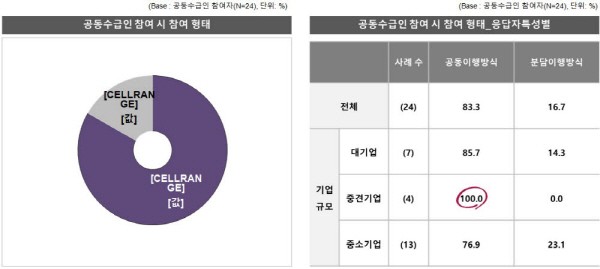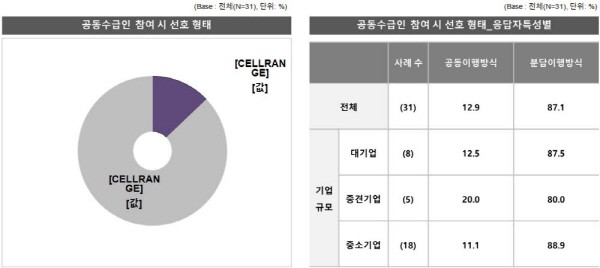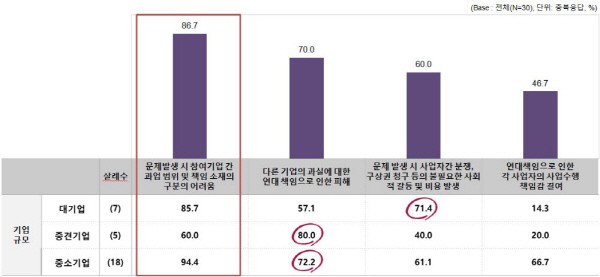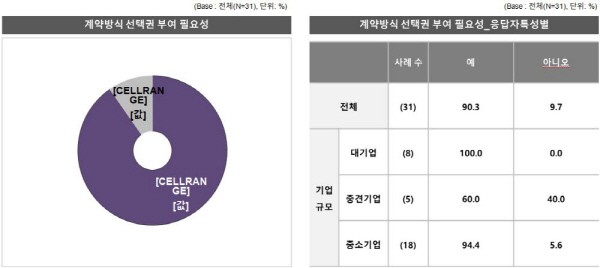
Although more than 80% of public software (SW) projects are carried out in the joint implementation method, 87% of information technology (IT) service companies participating in the project preferred the divided implementation method. The reason why they are reluctant about the joint implementation method is that the scope of tasks and responsibilities are unclear and the problem of joint responsibility is large. More than 90% of IT service companies have the opinion that business methods should be voluntarily determined by negotiating with the client.
On the 12th, the Korea IT Service Industry Association (hereinafter referred to as the Association) released the results of the 'Awareness Survey on Supply and Demand for Public SW Projects' conducted on 31 IT service companies, including 8 large enterprises, 5 medium-sized enterprises, and 18 small and medium-sized enterprises. The purpose of the investigation is to confirm the awareness of the joint implementation of joint responsibilities between business operators when participating in public SW projects as a consortium (joint supply and demand) and the divided implementation of divided responsibility for each business operator's scope of performance. This is the first time an industry perception survey has been conducted on both methods.

According to the survey, 83.3% of companies that participated in the public SW project as a consortium answered that the projects were carried out in a joint implementation method. In the case of medium-sized enterprises, it was found that all enterprises participated with the joint implementation method. 87.1% of companies participating in the survey preferred to carry out the divided implementation method. Only 12.9% of the respondents said they preferred joint implementation. The expectation that there would be a lot of companies that prefer joint implementation depending on the situation was wrong.
As for the difficulties (duplicate responses) due to the joint implementation, 86.7% of the responding companies selected 'difficulty in dividing the scope of tasks or responsibilities between participating companies in case of problems'. 'Damage caused by joint liability for the negligence of other companies' also reached 70%.

'In the event of a problem, unnecessary social conflicts and costs such as disputes between business operators and claims for indemnity arise' (60%) and 'each business operator's lack of responsibility for business execution due to joint responsibility' (46.7%) followed. 74.2% of companies answered that they needed improvement with respect to the current contract execution method from the ordering company to perform stipulated in the Request for Proposal (RFP) of only joint implementation contract. Only 3.2% answered that improvement was unnecessary. 90.3% of companies participating in the survey answered that they needed improvement so that they could at least choose the method of contract at the negotiating stage or negotiate with the ordering company at all.
The joint implementation method was called a 'modern version of the implicative system' among IT service and software companies, and demand for improvement continued. There is a high possibility of disputes, such as KCC Information and Communicationand other participating companies, which has been fighting over the responsibility for losses, are now starting legal actions. However, most of the clients choose the joint implementation method because of the convenience of management.

The Ministry of Economy and Finance has accepted the industry's opinions regarding 'contract system improvement TF' last year, but no action was taken in this year. Parliament also points out the problem. “The essence of the contract is voluntary negotiation, where the two contracting parties, A and B, stand on an equal footing,” said Yong-jin Koh, a member of the Strategy and Finance Committee (with the Democratic Party) and he emphasized “The Ministry of Economy and Finance and the Public Procurement Service should create a fair contract ecosystem so that A and B contract equally.” Rep. Ko raised the same issue in a state audit last year. Based on the results of the investigation, the Association plans to continuously deliver opinions on improving the contract system to the National Assembly and the Ministry of Economy and Finance.
By Staff Reporter Ho-cheon Ahn (hcan@etnews.com)